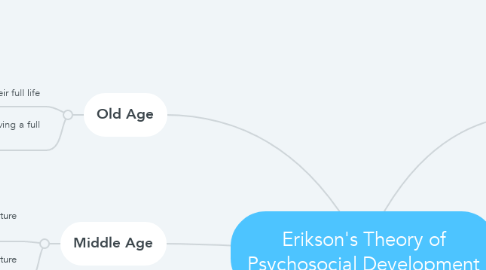Erikson's Theory of Psychosocial Development
ryley journeauにより

1. Old Age
1.1. Integrity: Feeling confident in their full life
1.2. Despair: Not feeling secure in having a full life
2. Middle Age
2.1. Generatively: Creating a legacy for future generations
2.2. Stagnation: Not leaving anything for future generations
3. Young Adulthood
3.1. Intimacy: Start creating close relationships
3.2. Isolation: No relationships means being distant from others
4. 12 to 18 years
4.1. Identity: Roles in society can change their personal identity
4.2. Role Confusion: Without clear roles they'll be unsure of who they are
5. Birth to 1 year
5.1. Mistrust: Children may fear everything if they aren't cared for right.
5.2. Trust: Learning to trust the world around them
6. 2 to 3 years
6.1. Autonomy: independence once guided
6.2. Shame and Doubt: If they aren't encouraged, children will feel ashamed.
7. 4 to 5 years
7.1. Initiative: Children will take it upon themselves to do certain tasks.
7.2. Guilt: If restricted the child will feel they can't do things themselves
8. 6 to 11 years
8.1. Industry: encouragement will result in pride and hard work
8.2. Inferiority: They'll feel inferior if they don't do well on assignments


